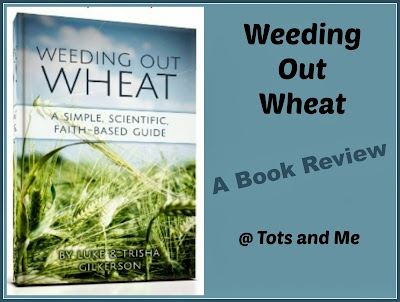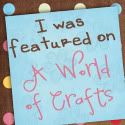*This post contains my affiliate link*
Luke and Trisha Gilkerson are the husband/wife team who authored the book Weeding Out Wheat: A Simple, Scientific, Faith-Based Guide. They have "a passion for truth in all aspects of life" and desire to share that with their readers over at Intoxicated On Life, their blog which they describe as "a one-stop-shop for learning about living a healthy home life."
Weeding Out Wheat is a wonderful book on the topic of eating wheat-free. I had been thinking of trying a wheat-free diet because of the way my health has been. I know people who have to eat gluten-free diets because of Celiac disease and wheat sensitivities. However, I wasn't sure if this was truly something that would be causing me my discomfort. I am so glad I took the time to read this book. The authors spent quite a bit of time studying and reading up on what some probably consider a new fad and they are sharing it with us in this resource.
I think one of the most important things they share in the book is why modern wheat is so different from ancient wheat. I know I had questioned why, if wheat has been around since the beginning of creation, so many people are finding themselves sensitive to wheat in modern times. And if I am questioning why, I am sure there are many others that are confused by this as well. As I was reading I was constantly stopping to reread important points to my husband. The authors start with a short discussion of how ancient wheat, called einkorn wheat, became emmer wheat which naturally mixed with Triticum tauschii, and created Triticum aestivum, the bread wheat family from Biblical times through the beginning of the 20th century. Then they share how wheat has been manipulated during the last half of the 20th century into something that is so different the reader can see how consumption of it can be questioned. The thing is, these changes took place with good intentions, increasing the yield to feed people; however, because the scientists didn't realize the changes were so huge they never tested the effect on human beings' health.
In the sub-section called Glutenstein's Monster the authors share that, "one experiment found fourteen new gluten proteins in the offspring that were not found in parent wheat plants." To me, this shows very simply how sensitivities to gluten could have sprung up in recent times and definitely raises a red flag. In fact, they share how there has been a 400% increase in Celiac Disease in the last 50 years.
In addition to seemingly innocent things like the hybridization (which changed the wheat so drastically) and the way it the wheat is now processed, I was appalled to discover that our wheat is being treated with toxic pesticides and irradiation. So many concerns over something as simple and seemingly necessary as bread.
After explaining the problems with the wheat itself, the authors start digging in to all the problems that may be associated with modern wheat, and it is not just the intestinal problems that people have come to link with Celiac Disease. In the section called "Wheat Gone Wild: Understanding Wheat's Connection to Deteriorating Health" you will find the following chapters:
- Some Necessary Definitions where the authors discuss the difference between wheat allergies, gluten intolerance, gluten sensitivity and Celiac Disease.
- Is Wheat-Free Right For You where the authors share some indications to help you decide whether you should consider a wheat-free diet. By the way, because of all the different conditions that are discussed in this chapter as being possibly linked to wheat and gluten, the authors actually suggest that everyone should at least try a wheat-free diet. However, they also admit that going wheat-free is not a "cure-all."
- Delete the Wheat where the authors share 7 reasons to go wheat-free based on a slew of problems that can be found due to the three anti-nutrients found in wheat (gluten, lectins, and phytates).
- Wheat's The Problem? where the authors share different tests that can be used to determine wheat-sensitivity. However, with all those tests, I chose to use the last one suggested, Give up Wheat. A minimum of 2 months is suggested as that is how long it may take for the toxins to leave your body so a difference can be seen.
- FAQ where you will find answers to frequently asked questions about wheat.
Another thing that I appreciate about this book is that they do not just focus on the scientific aspects of giving up wheat. Twenty-five pages (about 1/4 of the book) are focused on the Biblical concerns with going wheat-free. This section is called "Is Wheat-Free Biblical: Reconciling a Wheat-Free Diet With a Bread-Filled Faith" and in it you will find the following chapters:

- Wheat and Bread in the Bible where the authors discuss the references to wheat in the Bible, as a staple of life, used in worship, in the life of Jesus and how it is not always associated with abundance.
- Wheat is a Provision, Not an Obligation where the authors ask, not whether God endorses eating wheat, but whether God obligates us to eat wheat.
- Does God Have a Diet Plan where they discuss health and the kosher diet. They discuss whether God in the Bible states that physical health is the reason for a kosher diet and whether or not there is a biblically nutritional diet.
- The Bread of Life where the concerns of having communion with wheat-free bread are addressed.
- In Conclusion: What Does Wheat Free Living Have to Do With Our Faith? brings this section to a conclusion.
The book concludes with the section "Moving Forward: Making the Wheat-Free Transition." In this section you will discover the importance of choosing the right foods and making nutritionally sound choices in what to place in your body. There are guidelines on what to eat once one gives up wheat. The focus is on eating healthy and not substituting junk for the wheat that has been given up. They have included a list of books and other resources on their Weeding Out Wheat Resources Page to help readers along on their journey. They also invite those who are embarking on a wheat-free journey to join them at their Weeding Out Wheat: Encouragement and Support Facebook Group.
I have truly enjoyed having the opportunity to be on this launch team and to get a chance to read this book. They have done a wonderful
job describing in simple terms the importance of a wheat-free diet. They have
convinced me of the problems with modern-day wheat and reassured me that living
wheat-free is not anti-Biblical. The authors shared many different conditions that can be linked to wheat consumption. I know my oldest daughter has suffered migraines for a while and to find out they can be possibly linked to wheat was something that had never been mentioned. It is definitely something I want her father to look into. Additionally, who would have thought that skin problems could be linked to eating wheat. With my skin rashes and Amelia's itchy's I am so curious to see whether eliminating the wheat will help.
It is my goal to purge the house of wheat, but for now I have gone wheat-free myself and have been restricting it in Amelia's diet. I have to tell you I could tell a difference in my health within a week of going wheat-free. My tummy was feeling better (let's leave it at that, shall we?) and I had more energy and less "brain fog." And if that was not enough proof for me, I boo-booed during the holidays and ate some foods that had wheat in them. I did NOT feel well at all. I was curled up on the love seat Thanksgiving night. However, I didn't learn my lesson and gave in again at Christmas time. Again, the tummy aches came back, along with more gas and diarrhea. I am hoping to be able to stick with this new lifestyle in the new year and once the holidays roll around I will have some great gluten-free recipes in my recipe drawer.
You don't have to believe just my testimony. I love that the authors included testimonies throughout the book. People shared how they saw vast improvements in their health, from stomach aches going away, to skin problems disappearing, to "brain fog" being lifted. So many benefits seem to be linked to following a wheat-free lifestyle.
You can also check out my fellow launch team members' reviews of the book by going here.
Right now you can purchase the book at the special Launch Price. You can purchase the Kindle version for just $1.99 from Amazon from now through January 1st. The paperback version can be purchased for $9.95 from here, through January 1st. After that time the price will revert to the normal price, $9.95 for Kindle and $14.95 for paperback.
And stay tuned for this great giveaway going live soon. A great package to win to help in your healthy living lifestyle.

Disclosure: I received a copy of the book Weeding Out Wheat as a part of the Launch Team to facilitate my review. I received no other compensation. I was not required to write a positive review. All opinions are my own. This post contains my affiliate link.






























![[PREMIO2009.png]](https://blogger.googleusercontent.com/img/b/R29vZ2xl/AVvXsEjXD_Gx-wZ9EM5hXKrEYLksEBkYfRQtmb8VDVTDG_yyLggQoFIstZsh4zszdG20KqErZicRzEhiNYLty7j3IMXJYsABqkXjr8pp-ncj71xCbpxlXGbGpZq2fTuDQqq1RMKV4DPcDBnBViA/s1600/PREMIO2009.png)




No comments:
Post a Comment
Thank you for visiting my blog today. I love to read your comments, so please leave me one if you have the time.
Blessings